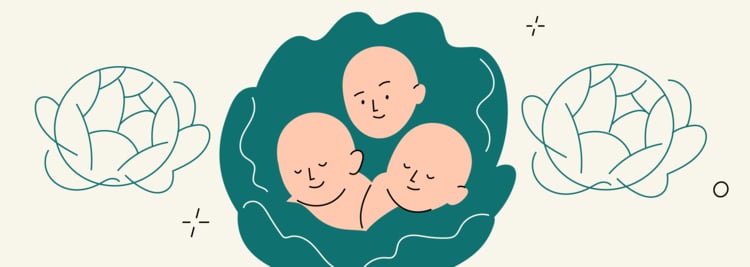Pregnant with triplets? Is the thought of multiple pregnancies totally nerve-wracking? Not to worry, because Flo’s delivering the ultimate guide to having not one, not two, but three bundles of joy!
-
Tracking cycle
-
Getting pregnant
-
Pregnancy
-
Help Center
-
Flo for Partners
-
Anonymous Mode
-
Flo app reviews
-
Flo Premium New
-
Secret Chats New
-
Symptom Checker New
-
Your cycle
-
Health 360°
-
Getting pregnant
-
Pregnancy
-
Being a mom
-
LGBTQ+
-
Quizzes
-
Ovulation calculator
-
hCG calculator
-
Pregnancy test calculator
-
Menstrual cycle calculator
-
Period calculator
-
Implantation calculator
-
Pregnancy weeks to months calculator
-
Pregnancy due date calculator
-
IVF and FET due date calculator
-
Due date calculator by ultrasound
-
Medical Affairs
-
Science & Research
-
Pass It On Project New
-
Privacy Portal
-
Press Center
-
Flo Accuracy
-
Careers
-
Contact Us
What to Expect When You’re Pregnant with Triplets


Every piece of content at Flo Health adheres to the highest editorial standards for language, style, and medical accuracy. To learn what we do to deliver the best health and lifestyle insights to you, check out our content review principles.
What is a multiple pregnancy?
A multiple pregnancy is when you carry more than one fetus in your uterus at a time. If your ovary releases more than one mature egg during a menstrual cycle (all of which are fertilized by sperm), it results in multiple embryos. This phenomenon produces fraternal twins (or triplets, etc.).
By contrast, the formation of multiple, identical embryos happens when a single fertilized egg breaks or splits. This kind of pregnancy produces identical twins. But can triplets be identical? Yes! Triplets, quadruplets, quintuplets, etc. may be fraternal, identical, or a combination of both. This essentially means that a multiple pregnancy could be the product of either of these two processes, or a blend of both.
Over the past 20 years, the rate of multiple pregnancies has noticeably increased in the U.S. They can come about naturally or through the use of fertility treatments.
Fertility medications that encourage ovulation often trigger the release of several eggs from your ovaries, eventually leading to multiple births. Alternatively, in vitro fertilization (IVF) sometimes transfers more than a single embryo to your uterus. Or, you might develop identical multiples after the transfer, if the fertilized egg splits.
Note that women over the age of 35 are more likely to have multiple pregnancies since they often release more than one egg during their menstrual cycle.
Nutrition while pregnant with triplets
If you’re pregnant with triplets, your dietary needs should be slightly different than someone who isn’t having multiple pregnancies. You’ll require an extra 300 calories per day for each fetus, in addition to your own usual caloric intake. As such, expect to put on more weight than you would with just one bun in the oven.
For example, if you’re expecting twins, you’ll want to consume another 600 calories per day. If you’re expecting triplets (or even more), then it really depends. Note that caloric intake is also impacted by your weight prior to multiple pregnancies, particularly if you were underweight or overweight before conception.
The best thing to do when you’re pregnant with triplets is to talk to your doctor about the ideal number of calories for nourishing triplets. They might recommend a lesser or greater amount based on your unique circumstances, and make helpful suggestions on the right diet for you.
In general, try to eat an assortment of nutritious foods containing plenty of carbohydrates, good fats, and proteins. A diet rich in milk, eggs, meats, cheeses, and nuts helps fuel your children’s growth. Also include whole grains and fresh fruits and vegetables, while cutting out sugar.
It’s crucial to get your recommended by doctor daily allowance of folic acid and iron to promote healthy fetal development. These can be found in prenatal supplements and fortified foods.
Sleeping during multiple pregnancies
Take a quiz
Find out what you can do with our Health Assistant

The majority of women experience sleep discomfort with a multiple pregnancy (be it twins, triplets, or more). You may struggle with back pain, heartburn, breathing problems, and constipation, which commonly occur in the gestational period.
Pregnant with triplets? Try lying on your side and placing a wedge-shaped pregnancy pillow between your legs and/or under your baby bump for comfort. Avoid sleeping on your back or stomach as it might aggravate breathing issues, backaches, digestive disorders, and low blood pressure. In these positions, the weight of your growing uterus presses on your major blood vessels and digestive tract.
Possible complications of being pregnant with triplets
Multiple pregnancies are very common nowadays and generally go fairly smoothly. However, it’s still important to be prepared for potential complications arising from a multiple pregnancy, including:
- Premature birth
Statistics show that more than half of all twins are born prematurely. The likelihood of preterm birth is even greater with triplets, etc. If you’re having a multiple pregnancy and observe symptoms of early labor, your doctor may use steroid injections to speed up your babies’ lung development. Unfortunately, your newborns might still struggle with digestive and breathing difficulties, infections, and vision problems.
Babies born before week 37 of pregnancy are vulnerable to both short and long-term conditions related to eating, breathing, and regulating body temperature. Behavioral and learning challenges may present later on, in childhood or adulthood. If your children arrive prior to week 32, they could have serious, perhaps life-threatening, medical issues.
Furthermore, the chances of developing cerebral palsy or other lifelong complications is higher with preterm multiples than a single premature baby of similar gestational age.
- Gestational diabetes
When you’re pregnant with triplets, or having any other type of multiple pregnancy, you may be at greater risk for gestational diabetes. High levels of blood sugar can affect your pregnancy and the babies’ health. Enlist the help of a registered dietitian, diabetes educator, or endocrinologist to properly manage your glucose levels.
- High blood pressure
You may also be likelier to experience high blood pressure during a multiple pregnancy as your body is undergoing additional physical strain.
- C-section delivery
For twins, it’s often possible to deliver the first baby vaginally if they’re in the ideal, head-down position. If complications occur, your doctor might recommend doing a C-section for the second baby. When it comes to triplets and higher multiples, though, a cesarean section is usually the method of choice.
Lastly, since multiple pregnancies can be so much more complex, you may need to see your obstetrician-gynecologist for frequent prenatal visits. Starting in the second trimester, you’ll probably require ultrasound examinations every four to six weeks. If your doctor suspects anything, they might do a biophysical profile, nonstress test, or suggest more frequent ultrasounds.
Takeaway
Multiple pregnancies occur either naturally or artificially (e.g., while you’re receiving fertility treatments). If you’re pregnant with triplets, your doctor may recommend consuming extra calories and making other adjustments, depending on your particular situation.
Possible complications associated with a multiple pregnancy include premature birth, gestational diabetes, high blood pressure, and C- section deliveries. That’s why it’s important to see your doctor regularly and allow them to closely monitor the health of you and your babies.


Hey, I'm Anique
I started using Flo app to track my period and ovulation because we wanted to have a baby.


The Flo app helped me learn about my body and spot ovulation signs during our conception journey.


I vividly
remember the day
that we switched
Flo into
Pregnancy Mode — it was
such a special
moment.
Real stories, real results
Learn how the Flo app became an amazing cheerleader for us on our conception journey.
References
History of updates
Current version (16 March 2020)
Published (16 March 2020)
In this article

Get your personal guide to pregnancy with the Flo app
-
Follow your baby's growth week by week
-
Get expert info on symptoms, safe foods, and more
-
Chat with other parents-to-be




